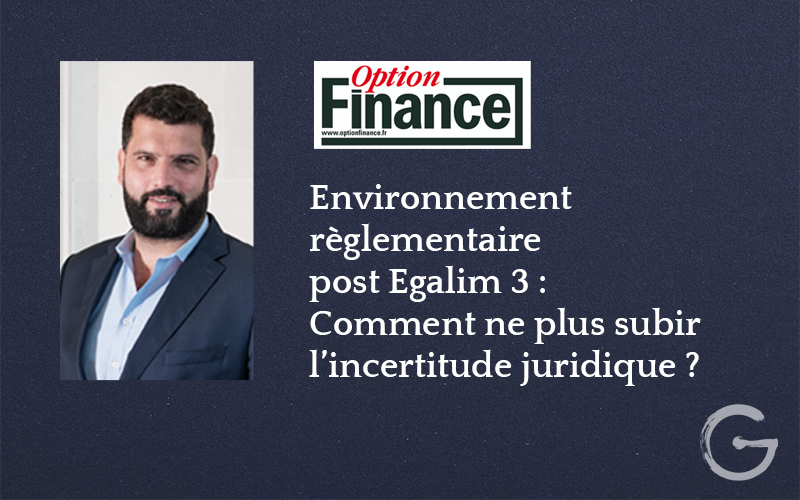Article published in Option finance, Monday, November 13 and reproduced with the kind permission of Valérie Nau, editor-in-chief
By Philippe Jouvet, associated.
Regulatory environment post Egalim 3: how to no longer suffer from legal uncertainty?
While the government has already announced an “Egalim 4” simplification law, the stakeholders concerned are still struggling to digest the reforms to industry-commerce relations which have been accelerating since 2018.
However, it is possible to take advantage of this regulatory tangle. Illustration on 3 hot topics: logistical penalties, anticipation of agreements and new upstream certification of the independent third party.
The news never ends in the field of relations between suppliers and large retailers :
- September 21st : publication of new DGCCRF guidelines on logistics penalties;
- end of October : publication (restricted) of the new opinion of the national company of auditors (CNCC) on the certificates linked to EGALIM price transparency;
- beginning of November : adoption of the bill relating to emergency measures to combat inflation concerning consumer products.
Olivia Grégoire, Minister for SMEs and Commerce, also confirmed the upcoming constitution of a government mission bringing together parliamentarians in order to simplify the rules of Title IV of the Commercial Code which have been undergoing an overhaul on an annual basis for 15 years and see almost half-yearly since 2018.
What will be the projects for this simplification? Are we going to see the disappearance of the deadline for annual commercial negotiations, legally set on 1er March and exceptionally reduced to January 31 (or January 15 for companies with a turnover of less than 350 million euros) for the year 2024? Will the principle of free negotiability introduced in 2008 with the LME law, which should go hand in hand with a real policy of sanctioning abuse, finally be enshrined?
While waiting for the simplification project which should last until spring 2024, we must deal with the existing situation and try to use the regulatory labyrinth to our advantage.
Logistics penalties: optimize the 2% ceiling rule by playing on the notion of category
The Frequently Asked Questions serving as updated guidelines on logistics penalties, published on September 21, 2023, were to provide much-awaited clarification on the modalities for taking into account the ceiling rule on penalties inflicted by distributors. at 2% of the value of the products ordered falling within the category of products within which the non-performance of contractual commitments was noted » according to article L.441-17 of the Commercial Code.
The notion of " catégorie » of products is particularly explained. This explanation of the text was expected as it has a significant impact on the amounts that will have to be paid by suppliers for penalties: the latter want the category to stick as closely as possible to the EAN code of the product where their customers see much broader (all products sold by the supplier). For the Administration, the products “ sufficiently homogeneous ". Illustration given by the FAQ: within dairy products, yogurt and butter are two different product categories.
The DGCCRF, without finding the miracle recipe, gives some ideas so that stakeholders can properly rework their contractual documents (CGV and logistics agreement in particular).
Homogeneity is a concept known in competition law to define relevant markets. It is therefore interesting for a supplier of build your category according to the characteristics of the product or the preferences of the consumer and to defend it to its customer in order to arrive at a category that makes sense with the aim of capping logistical penalties.
Remember, however, that these penalties must, whatever the definition of product category chosen, be justified by documentary evidence demonstrating the damage suffered by the customer.
Advancement of the deadline to January 15 or 31, 2024: anticipate legal anticipation
The law on emergency measures to combat inflation concerning consumer products [1] has the stated objective of bringing down the prices of consumer products, particularly food, on the shelves of supermarkets as quickly as possible.
The aim is to allow buyers to negotiate the supplier's price earlier and take advantage of the drop in inputs observed during 2023 while passing it on to consumers; the new agreed price being theoretically applicable today from January 16 or January 1er February and not from 1er March as is usually the rule.
First remark: for suppliers of products whose input costs have not fallen, the new law constitutes the opportunity to pass an anticipated and beneficial price increase and to best manage the possible shortage on the volumes that they may experience . When the ultimate challenge is to avoid stopping deliveries because the price negotiated in March 2023 is too low to continue selling, having a month in advance of its negotiation is not a luxury.
Second remark : the advancement of the deadline for 2024 (and only 2024 with regard to the text of the law) should theoretically see an agreed price apply from January 16 (or 1er February) until 1er March 2025 (since at constant law, we should return to the initial deadline of 1er March). Given this long period, suppliers must urgently consider the possibilities left by the regulations to modify their prices during the year: review clause, automatic indexation clause, new price adopted during the year, etc.
We know that for renegotiation clauses (article 441-8 of the Commercial Code) and indexation clauses (article L.443-8 of the Commercial Code), players in the agri-food sector have currently rather attempted to neutralize their implementation than to use their potential.
Certification of the independent third party under option 3: take advantage of the new CNCC opinion
We find ourselves here at the heart of the complexities created by the various Egalim laws which aimed to protect the share of agricultural raw materials in the tariff and therefore to protect agricultural producers. To this end, the Egalim 2 law of October 2021 provided for three price transparency options, which must be reproduced in the T&Cs in the event of the sale of a food product.
The Descrozaille law of March 30, 2023, often wrongly called “ Egalim 3 » (its provisions in fact target all consumer products and not just food products) provides, for option 3, two mandatory interventions by the independent third party:
- the first, prior to the negotiations, to certify the part of the evolution of the supplier's price which results from that of the price of agricultural raw materials: “ex ante certification”;
- the second, at the end of the negotiations, to certify that the said negotiations did not relate to the part of the evolution of the supplier's price which results from that of the price of agricultural raw materials, said for the purposes of this technical opinion: “ex post certification”.
In support of these two certificates is the famous methodological note describing the procedure put in place by the supplier to determine the evolution of the supplier price of the product and the part of this evolution resulting from that of the price of agricultural raw materials in N compared to N-1 (previous year).
This note is drawn up by the supplier before transmission to the independent third party. Before the negotiation, it is a real opportunity to build a price that will resist the negotiation pressure from the buyer.
Indeed, in the calculation of the price of agricultural raw materials or in the evaluation of the impact of this price in the tariff, the methodological note can leave a certain margin of appreciation on the hypotheses retained, which can be validated by the independent third party, thus giving more weight to the arguments used when constructing the tariff.
It is therefore recommended to co-construct with the independent third party (often the auditor) the methodological note. The latter will be able to validate hypotheses, even the most daring, to the extent that the modus operandi detailed in the CNCC opinion is respected.
This last illustration demonstrates to what extent stakeholders have an interest in embracing rather than suffering the complexity born from the latest laws passed in terms of industry-commerce relations. The people at the heart of commercial negotiations, the supplier's sales team and large-scale distribution buyers, have also learned to consolidate all of the reforms that have taken place and have often developed legal skills in addition to their own skills.
Continual legislative changes also invite us to imagine new contractual automation solutions to harmonize and secure the content of different documents.
[1] We are writing this article before the final vote and promulgation which should take place during the week of November 6, 2023.

Philippe Jouvet
Partner
A lawyer specializing in competition, distribution and consumer law, philippe jouvet is an expert in the agricultural and agri-food sector.
Before joining Ginestié Paley-Vincent as a partner, Philippe Jouvet was Legal Manager for competition, distribution and consumption within the TEREOS cooperative within which he implemented the system provided for by the EGALIM Law.





